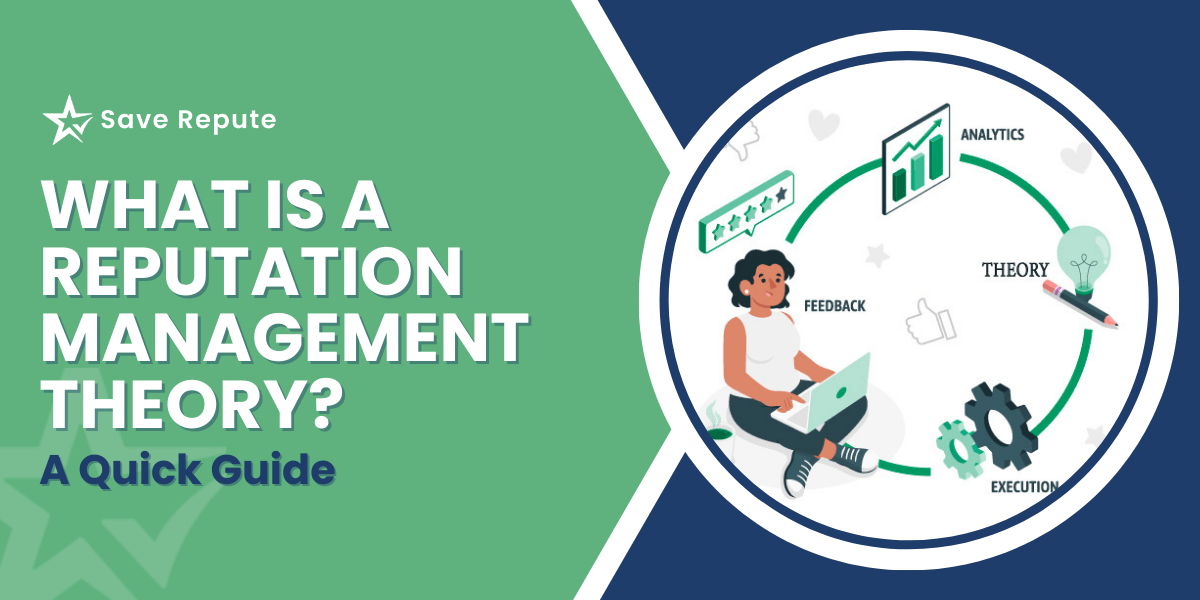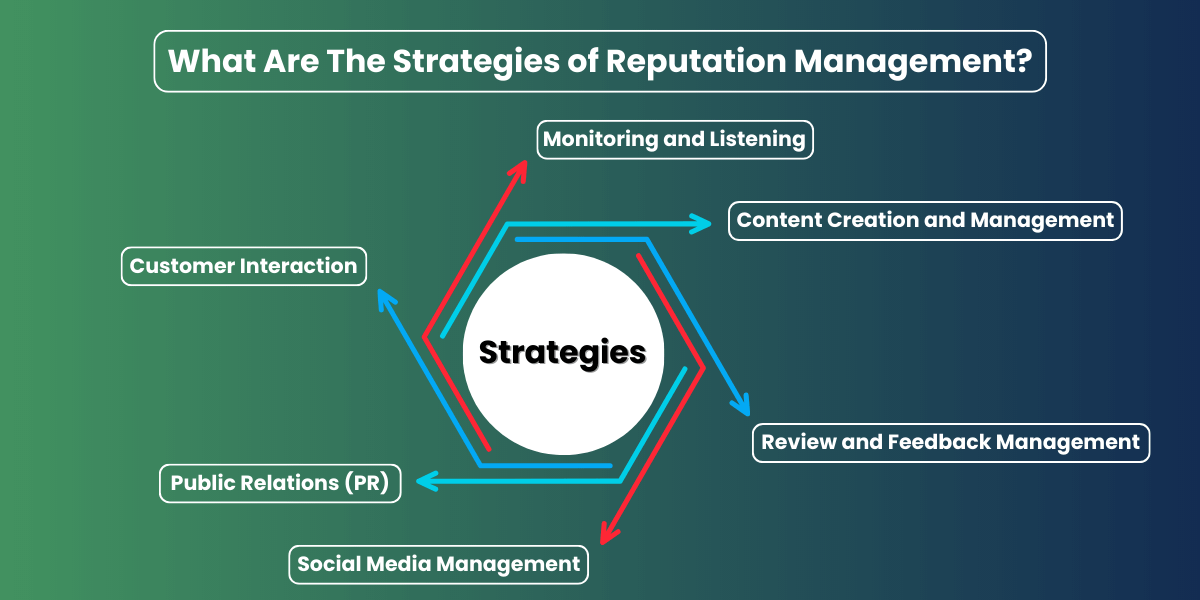Reputation or reputation management theory helps organizations or individuals form and organize the reputation of their specific brand. Get ready to dive into the fascinating world of building and safeguarding standings.
In this blog post, we’ll explore the secrets behind maintaining a positive image and the strategies that can help individuals and organizations thrive in the eyes of others. Let’s unlock the power of reputation together.
What Is Reputation Theory Or Reputation Management Theory?
Reputation theory and reputation management theory are both interrelated terms. Reputation theory defines what reputation is, how it forms, and how it influences decision-making and behavior. On the other hand, online reputation management theory defines how reputation can be strategically managed and manipulated virtually. It usually focuses on creating, maintaining, or restoring reputations within organizational or individual contexts. Both reputation theories play a critical role in society and interpersonal relationships.
Example Of Corporate Reputation Theory: An excellent example of reputation theory is a local bakery in local society. Where it gains trust and customers for having a good quality and quantity of sourdough bread.
The reputation management theory example is the tech industry, where its data breaches and affects its users. However, the company makes strategies to restore public trust, including transparent communication and offering free identity protection services.
Why Does Reputation Management Theory Is Important?
Reputation management theory is critical because it provides a framework for strategically building, maintaining, or restoring an individual’s or organization’s reputation. In today’s interconnected and information-rich world, reputation can be one of the most valuable assets or liabilities.
A good reputation can lead to customer loyalty, increased business, and competitive advantage. Conversely, a poor reputation can result in lost opportunities, decreased stakeholder trust, and long-term damage that can be costly and time-consuming to repair. Understanding and applying the principles of reputation management theory can better navigate challenges and leverage opportunities related to public perception.
Importantly, this also includes managing online reputation management reviews, which can significantly influence an entity’s reputation in the digital age.
How Does Reputation Management Work?
Reputation management works by strategically knowing how others perceive an organization or individual. This includes:
- Assessment: The first step involves evaluating the existing reputation. This can be done through surveys, tracking online reviews, and analyzing media coverage.
- Objective Setting: Based on the assessment, clear objectives for reputation management are established. These can range from improving customer satisfaction ratings to mitigating the fallout from a crisis.
- Strategy Development: A targeted strategy is developed to achieve the set objectives. This could involve a public relations campaign, social media engagement, or search engine optimization tactics.
- Implementation: The chosen strategies are then executed. This may involve releasing press statements, engaging with customers online, or initiating community outreach programs.
- Monitoring: Key Performance Indicators (KPIs) are monitored to evaluate the effectiveness of the strategies. This could include tracking changes in online reviews, website traffic, or mentions in the media.
- Adjustment: Based on the monitoring results, strategies may be adjusted or optimized to meet the objectives better.
- Feedback Loop: Continuous feedback mechanisms are implemented to keep track of new developments affecting reputation, leading to ongoing assessment and strategy adjustments as necessary.
What Are The Strategies of Reputation Management?
Online Reputation Management (ORM) strategies focus on creating, maintaining, and recovering a positive online image for individuals, brands, or organizations. Digital media, online reviews, and social platforms have made ORM increasingly important. Below are some common strategies for managing online reputation:
1- Monitoring and Listening
Regular Monitoring: For regular reputation monitoring, you can use tools like Google Alerts or specialized ORM software to monitor mentions of your brand, products, or name across the web.
Social Listening: Monitor social media platforms for mentions and discussions, both positive and negative, to understand public sentiment.
2- Content Creation and Management
SEO-Optimized Content: Create quality, search-engine-optimized content that ranks high in search results to push down negative content.
Regular Publishing: Consistently publish relevant, high-quality content across various platforms to dominate search engine results.
Content Removal: Identify and request removal of false, misleading, or damaging content, if possible.
3- Review and Feedback Management
Encourage Positive Reviews: Ask satisfied customers to leave positive reviews on platforms like Google My Business, Yelp, or industry-specific review sites.
Address Negative Reviews: Respond to negative reviews professionally and offer solutions to dissatisfied customers. Ignoring or deleting negative reviews is generally not advisable.
Automated Review Monitoring: Utilize software tools that aggregate reviews from various platforms, allowing for easier monitoring and responses.
4- Social Media Management
Profile Optimization: Make sure all social media profiles are complete, up-to-date, and reflect your brand’s values and messaging.
Active Engagement: Regularly post updates and engage with followers to build a community around your brand or identity.
Crisis Management: In the event of negative publicity, have a well-planned response strategy to address issues transparently and quickly.
5- Public Relations (PR)
Press Releases: Issue press releases for significant company milestones, product launches, and other news to dominate search results with positive stories.
Media Relations: Establish relationships with media professionals to gain favorable coverage and to have channels for communication in case of a reputation crisis.
6- Customer Interaction
Customer Service: Offer excellent customer service through online platforms to create positive experiences that customers will share.
FAQs and Information: Maintain a comprehensive FAQ section on your website to address common concerns and questions, improving your image as transparent and helpful.
How Effective Is Online Reputation Management?
The effectiveness of online reputation management (ORM) is often marked by key indicators such as improved search engine rankings and enhanced customer trust. When executed correctly, ORM strategies can successfully mitigate the impact of negative reviews and promote a positive online reputation, thereby contributing to a brand’s overall success and competitive advantage. In short, effective online reputation management can be crucial in maintaining and elevating a brand or individual’s standing in the digital world.
Final Thoughts
Reputation management is very crucial for small or large businesses. To grow your business effectively, you should execute your brand from a reputation management perspective. It will help boost your reputation and stand out in the competitive market. Furthermore, you can contact SaveRepute for a high-performance brand image.



